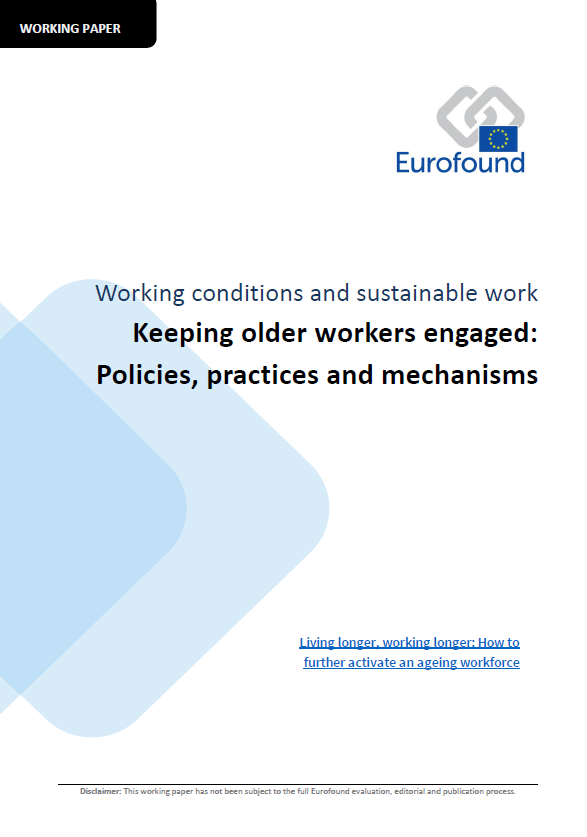EU context
Lai gan pēdējā desmitgadē daudzās ES valstīs vecāku darba ņēmēju nodarbinātības rādītāji ir ievērojami uzlabojušies, Eiropas Komisijas 2017. gada vienotajā nodarbinātības ziņojumā ir aplūkotas šo rādītāju turpmākās paaugstināšanas iespējas. Vecāku darba ņēmēju nodarbinātības rādītājs vecuma grupā no 55 līdz 64 gadiem 2016. gadā ES bija 55,3 % salīdzinājumā ar 66,6 % kopumā vecuma grupā no 15 līdz 64 gadiem. Vislielākais pieaugums bija vērojams vecāku sieviešu vidū.
Eiropas sociālo tiesību pīlārs nosaka sistēmu, ko piemērot, lai darba tirgi varētu pielāgoties jaunajiem uzdevumiem, vienlaikus sekmējot taisnīgumu un solidaritāti paaudžu starpā. Tajā uzsvērtas tiesības uz darba ņēmēja profesionālajām vajadzībām pielāgotu darba vidi, lai nodrošinātu iespējami ilgāku dalību darba tirgū. Turklāt nesen noslēgtajā Eiropas sociālo partneru autonomajā nolīgumā par aktīvām vecumdienām un starppaaudžu pieeju pausta apņemšanās atvieglot vecākiem darba ņēmējiem ilgāku aktīvu līdzdalību darba tirgū.
Eurofound darbs
Eurofound ir gadiem ilgi uzkrātas speciālās zināšanas jautājumos, kas saistīti ar darbaspēka novecošanu. Pētījumos kopš 1990. gada uzmanība ir pievērsta vecāku darba ņēmēju līdzdalībai darba tirgū, darba rezultātiem, darba apstākļiem un vēlamajam darbam politikas kontekstā saistībā ar Eiropas mainīgo demogrāfisko profilu. Šajā darbā uzmanība tika pievērsta arī valsts atbalstam un uzņēmumu iniciatīvām, kas sekmē vecāku darba ņēmēju nodarbinātību. Tika aplūkoti jautājumi saistībā ar vecākām darba ņēmējām, uzsverot, ka šajā grupā ir paaugstinājušies nodarbinātības rādītāji un ir palielinājies šīs grupas īpatsvars darbaspēkā, jo īpaši vecuma grupā no 55 līdz 64 gadiem.
Apsekojumu dati
Eurofound lielākās aptaujas sniedz vispusīgus datus par vecāku darba ņēmēju situāciju. Sestajā Eiropas darba apstākļu apsekojumā (EWCS) aplūkots, kā vecāki darba ņēmēji salīdzina dažādas darba kvalitātes dimensijas. Lai gan šķiet, ka vecāki darba ņēmēji darbu zaudē retāk nekā jaunāki darba ņēmēji, dati liecina, ka vecāki darba ņēmēji uzskata — zaudējot darbu, viņi nevarētu atrast līdzvērtīgi apmaksātu darbu un pat ar grūtībām varētu atgriezties darba tirgū.
Pētījumā, kura pamatā ir Eurofound piektais Eiropas darba apstākļu apsekojums (EWCS), ir aplūkots, kādas ir iezīmes vecākam darbaspēkam un darbam dažādās vecuma grupās, kā arī faktori, kuri darbspēkam, kas noveco, nodrošina darba ilgtspēju: labi darba apstākļi, fiziskā un garīgā labjutība un darba un privātās dzīves līdzsvars.
Eurofound Eiropas dzīves kvalitātes apsekojums (EQLS) sniedz konstatējumus attiecībā uz vecumu saistībā ar dažādām dzīves kvalitātes dimensijām Eiropā. Analizējot vēlamo darbu vecuma grupā pēc 50 gadiem, ņemti vērā konstatējumi no trešā EQLS un secināts, ka daudzi vecāki darba ņēmēji, pat ņemot vērā finansiālās vajadzības, vēlas strādāt mazāk stundu. Atvieglojot darba stundu un vēlamā darba pielāgošanas iespējas, var motivēt cilvēkus un nodrošināt viņiem iespēju strādāt ilgāk.
Ilgāka darba dzīve
Nesen Eurofound kopā ar trim citām ES aģentūrām centās rast vecumam labvēlīgas darba iespējas Eiropā, apzināja politikas uzdevumus saistībā ar darbaspēka novecošanu un inovatīvus risinājumus.
Daudzi darba ņēmēji nespēj vai nav motivēti strādāt līdz valsts noteiktajam pensijas vecumam. Tomēr ir arī kāda grupa, kas spēj un grib strādāt arī pēc šā vecuma sasniegšanas. Eurofound ir pētījis šo aizvien pieaugošo vēlmi turpināt darbu arī pēc pensionēšanās.
Jaunākajā pētījumā uzmanība bija pievērsta darba dzīves paildzināšanai, izmantojot elastīgas pensionēšanās shēmas, īpašu uzmanību pievēršot daļējas pensionēšanās shēmām, kas šo procesu varētu atvieglot. Arī karjeras vidusposma pārskats var sekmēt darba dzīves paildzināšanu. Pētījumā tika arī analizēts, kā tas var palīdzēt noskaidrot darba ņēmēju iespējas strādāt arī līdz vēlākam pensionēšanās vecumam. Tajā aplūkoti dažādi mehānismi, ko uzņēmumi izstrādājuši, lai saglabātu darbā vecākus darba ņēmējus.
Citos pētījumos ir dokumentētas valstu valdību un nozaru sociālo partneru iniciatīvas saglabāt vecāku darba ņēmēju līdzdalību darba tirgū, tostarp finansiāla atlīdzība un labāki darba apstākļi. Kādā no iepriekšējiem projektiem tika analizētas vecuma pārvaldības iniciatīvas pirms un pēc ekonomikas lejupslīdes, lai apzinātu labas prakses piemērus Eiropas uzņēmumos.
Resursi
















